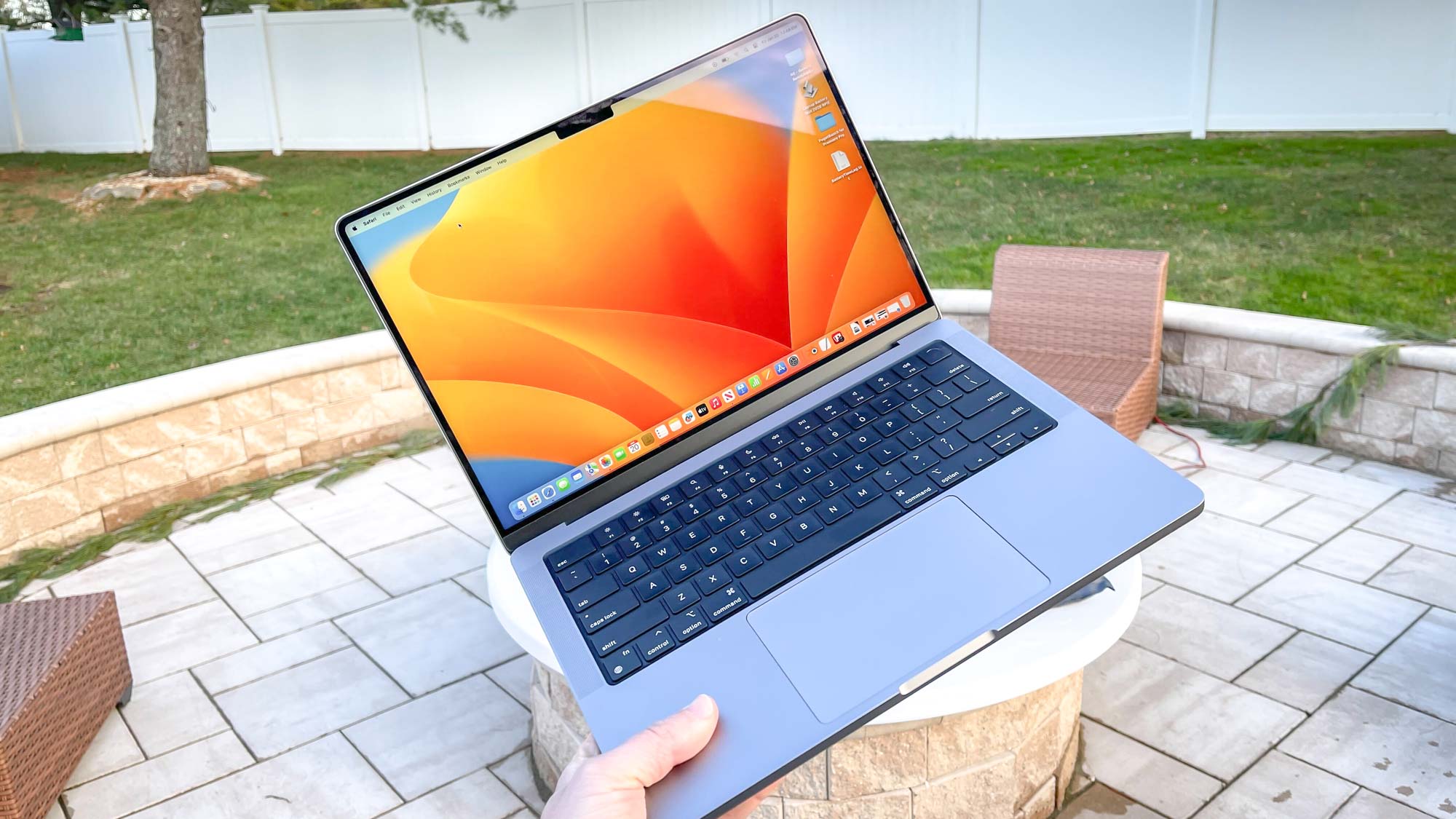MacBook Pro 14-inch M2 Pro and M2 Max benchmarks — here's how fast it is
The new MacBook Pro 14-inch M2 Pro is super fast, but the M2 Max takes graphics performance to the next level

The short version? The MacBook Pro 14-inch 2023 is the fastest laptop we've tested in a wide range of benchmarks. Yes, the M2 Pro chip inside is that powerful. And the optional (but quite expensive) M2 Max chip really takes graphics performance up a notch.
We just tested the MacBook Pro M2 Max chip for our MacBook Pro 14-inch 2023 review, and we have access to the M2 Pro benchmarks thanks to our sister site Laptop Mag. Here are the two configurations we tested and the full results in Geekbench, photo editing, video editing, 3DMark and more.
MacBook Pro 14-inch 2023 benchmarks: What we tested
The MacBook Pro 14-inch starts at $1,999 / £2,149 / AU$3,199 and includes a 10-core M2 Pro CPU, a 16-core GPU, 16GB of unified memory and 512GB of SSD storage.
The M2 Max model we tested takes everything to the extreme. That $4,099 / £4,349/ AU$6,499 configuration packs a 12-core CPU, 38-core GPU, 64GB of memory and 2TB of storage.
Thanks to our sister site Laptop Mag, we also have the test results for the M2 Pro version, although this is a pricier configuration than the entry-level model. It offers a 12-core CPU, 19-core GPU, 32GB of RAM and 2TB of storage for $3,299.
We will follow up with results for the entry-level M2 Pro MacBook Pro once we get it in for testing.
For comparison we tested a Dell XPS 15 with a 12th gen Intel Core i7 CPU, 16GB of RAM and 512GB SSD, plus Nvidia GeForce RTX 3050 Ti graphics for $2,299. We also tested an HP EliteBook 840 G9 business laptop with a 12th gen Core i7 VPro CPU, 16GB of RAM and 512GB SSD and Intel Iris X graphics for $2,868.
Get instant access to breaking news, the hottest reviews, great deals and helpful tips.
Note that Intel 13th gen laptops will offer faster performance, but those are not yet available for testing.
Geekbench (overall performance)
| Single-core score | Mutli-core score | |
| MacBook Pro 14-inch M2 Pro | 1,941 | 14,965 |
| MacBook Pro 14-inch M2 Max | 1,926 | 14,939 |
| Dell XPS 15 | 1,757 | 11,258 |
| HP EliteBook 840 G9 | 1,728 | 10,578 |
| MacBook Pro 14-inch M1 Pro | 1,768 | 12,477 |
| MacBook Pro 13-inch M2 | 1,898 | 8,911 |
On Geekbench 5, which measures CPU performance, the MacBook Pro 14-inch M2 Pro version notched a single-core score of 1,941 and the M2 Max version hit a similar 1,926. Both models cleared 14,900 on the multi-core test.
Overall, the MacBook Pro 14-inch is about 9% faster in single-core performance versus the previous M1 Pro and 17% faster in multi-core. The 2022 MacBook Pro 13-inch with M2 registered 1,899 and 8,911, so it's well behind on multi-core speed.
The Dell XPS 15 and HP EliteBook 840 G9 were both below 1,800 on single-core and below 12,000 on mulit-core. To be fair, the Core i9 version of the XPS 15 should be faster, but that wasn't available for testing.
Handbrake (video transcoding)
| Time (min:sec) | |
| MacBook Pro 14-inch M2 Pro | 4:03 |
| MacBook Pro 14-inch M2 Max | 4:06 |
| Dell XPS 15 | 5:42 |
| HP EliteBook 840 G9 | 6:58 |
| MacBook Pro 14-inch M1 Pro | 4:51 |
| MacBook Pro 13-inch M2 | 6:51 |
For this test we use the Handbrake app to transcode a 6.5GB 4K video to 1080p. The new MacBook Pro 2023 with M2 Pro took just 4 minutes and 3 seconds to complete the task. Oddly, the M2 Max version was a tad slower at 4:06.
The Dell XPS 15 was over a minute and a half slower with 5:42, and the HP EliteBook was nearly 3 minutes behind at 6:58.
The MacBook Pro M1 Pro needed 4 minutes and 51 seconds to complete the same task, so the new MacBook Pro M2 is about 18% faster.
PugetBench Photoshop test
| Score | Time (min:sec) | |
| MacBook Pro 14-inch M2 Pro | 988 | 4:20 |
| MacBook Pro 14-inch M2 Max | 1,199 | 3:57 |
| Dell XPS 15 | 962 | 5:42 |
| HP EliteBook 840 G9 | 920 | 5:16 |
| MacBook Pro 14-inch M1 Pro | 806 | 4:54 |
| MacBook Pro 13-inch M2 | 817 | 4:54 |
The PugetBench PhotoShop test assigns a score based on how effectively a system uses scripts to apply a series of filters and other adjustments to a number of high-res photographs. The test also times how long each system takes.
The MacBook Pro 14-icnch 2023 scored 988 with the M2 Pro chip and took 4:20 to complete the test. The M2 Max version scored 1,199 and was even faster at 3:57. The M1 Pro MacBook Pro scored a much lower 806.
The Dell XPS 15 (962, 5:42)) and HP EliteBook 840 G9 (929, 5:16) were not too far behind in terms of the overall score, but were considerably slower.
PugetBench Premiere Pro test (video)
| Score | |
| MacBook Pro 14-inch M2 Pro | 942 |
| MacBook Pro 14-inch M2 Max | 1,009 |
| Dell XPS 15 | 616 |
| HP EliteBook 840 G9 | 378 |
| MacBook Pro 14-inch M1 Pro | Did not run |
| MacBook Pro 13-inch M2 | 552 |
The PugetBench Premiere Pro test involves taking a 4K clip and applying a Lumetri Color effect and adding 12 clips across four tracks in a multi-camera sequence.
The MacBook Pro 14-inch M2 Pro scored 942, which handily beats the Dell XPS 15 (616) and HP EliteBook 840 G9 (378). The M2 Max model hit an even higher 1,009.
Unfortunately, the MacBook Pro M1 Pro couldn't run this test when we ran it in 2021, but the MacBook Pro 13-inch M2 turned in a score of 552. So the M2 Pro MacBook Pro is 52% faster than the 13-inch model.
Blackmagic disk speed test (SSD)
| Score | |
| MacBook Pro 14-inch M2 Pro | 5,293 / 6,168 |
| MacBook Pro 14-inch M2 Max | 5,319 / 6,402 |
| Dell XPS 15 | 4,045 / 4,468 |
| HP EliteBook 840 G9 | 4,784 / 5,207 |
| MacBook Pro 14-inch M1 Pro | 5,321 / 5,377 |
| MacBook Pro 13-inch M2 | 2,794 / 2,953 |
The Blackmagic disk speed test gauges SSD performance by measuring both read speed and write speed in MBps. The MacBook Pro 14-inch with M2 Pro hit 5,293 MBps reads and 6,168 Mbps writes, and the M2 Max version was a bit faster at 5,319 / 6,402 Mbps.
The Windows competition was once again well behind. Note that the MacBook Pro 13-inch M2 was about half as fast as the new MacBook Pro 14-inch. The M1 Pro MacBook Pro had similar read speeds to the M2 Pro version but the newer MacBook has faster writes.
We look forward to testing the entry-level MacBook Pro 14-inch M2 Pro to see if the SSD is as fast as pricier configurations from Apple.
3DMark Wild Life (graphics)
| Wild Life Unlimited | Wild Life Extreme Unlimited | |
| MacBook Pro 14-inch M2 Pro | 47,844 / 287 fps | 12,939 / 77.5 fps |
| MacBook Pro 14-inch M2 Max | 89,902 / 538 fps | 21,420 / 128.3 fps |
| MacBook Pro 14-inch M1 Pro | 38,406 / 230 fps | 10,386 / 62.1 fps |
| MacBook Pro 13-inch M2 | 24,892 / 149 fps | 6,819 / 40.83 fps |
3DMark Wild Life Unlimited measures graphics performance, delivering an overall score and frame rate (fps). It is not available on Windows, which is why we're only comparing Macs in this case.
The MacBook Pro 14-inch M2 Pro scored 47,844 and 287 frames per second. But the M2 Max chip nearly doubled those results, hitting 89,902 and 538 fps. On the more demanding Extreme test, the M2 Max model was nearly 9,000 points higher and 50 fps higher.
The MacBook Pro M1 Pro scored 38,406 and 230 fps, so that's a pretty big jump of about 20% for the M2 Pro.
Rise of the Tomb Raider (gaming)
| 1920 x 1200 | 3024 x 1964 | |
| MacBook Pro 14-inch M2 Pro | 48.6 fps | 20. 9 fps |
| MacBook Pro 14-inch M2 Max | 73 fps | 34 fps |
| Dell XPS 15 | 38.4 fps* | 11.04 fps** |
| MacBook Pro 14-inch M1 Pro | 39.3 fps | 17.1 fps |
| MacBook Pro 13-inch M2 | 24.9 fps | 12. 2 fps |
* 1920 x 1080 resolution ** At 3,456 x 2,160 resolution
We ran the Rise of the Tomb Raider benchmark to see how well the MacBook Pro 14-inch 2023 can handle mainstream games, although this is an older title. The M2 Pro MacBook Pro hit 48.6 fps at 1920 x 1200 resolution, compared to 39.3 fps for the 2021 model with M1 Pro.
The M2 Max version with 38-core GPU delivered a much higher 73 fps at 1920 x 1200 pixels and a playable 34 fps at the higher 3024 x 1964 resolution. The M2 Pro model mustered only 20.9 fps at that resolution, which is not really playable.
The Dell XPS 15 with its Nvidia GeForce 3050 Ti GPU delivered a fairly smooth 38.4 at 1920 x 1080 resolution but only 11 fps at 3,456 x 2,160 pixels.
Bottom line
The MacBook Pro with M2 Pro largely lives up to the hype with Apple's new silicon. It's not a quantum leap ahead of the M1 Pro, but it is notably faster in multiple benchmarks. We saw a pretty big jump in photo editing performance and video transcoding speed, and the M2 Max chip provides a huge GPU boost. And it should with the 38-core GPU we tested.
One thing is for sure. Windows laptops have some catching up to do.
Mark Spoonauer is the global editor in chief of Tom's Guide and has covered technology for over 20 years. In addition to overseeing the direction of Tom's Guide, Mark specializes in covering all things mobile, having reviewed dozens of smartphones and other gadgets. He has spoken at key industry events and appears regularly on TV to discuss the latest trends, including Cheddar, Fox Business and other outlets. Mark was previously editor in chief of Laptop Mag, and his work has appeared in Wired, Popular Science and Inc. Follow him on Twitter at @mspoonauer.
 Club Benefits
Club Benefits






